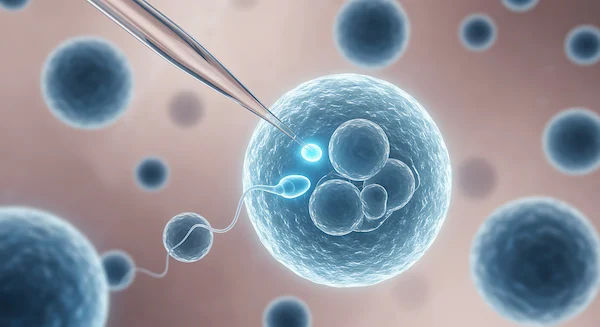Guide to Preparing For Pregnancy
Discover the ultimate 12-step guide to preparing for pregnancy. Learn about essential checkups, nutrition, lifestyle changes, fertility tracking, and partner support to create a healthy foundation for your future baby.

Written by Dr. M L Ezhilarasan
Reviewed by Dr. D Bhanu Prakash MBBS, AFIH, Advanced certificate in critical care medicine, Fellowship in critical care medicine
Last updated on 13th Jan, 2026

Introduction
Embarking on the journey to parenthood is one of life's most exciting decisions. While much focus is placed on the nine months of pregnancy, the preparation phase before conception—often called the preconception period—is equally crucial for a healthy pregnancy and baby. Think of it as laying the strongest possible foundation for your future child's well-being. This comprehensive guide is designed to walk you through every step of preparing for pregnancy, moving beyond the basics to provide a holistic action plan. Whether you're just starting to think about growing your family or have been trying for a while, these evidence-based steps on optimising your health, understanding your cycle, and creating a supportive environment will empower you on your path to parenthood. We'll cover everything from essential medical checkups and nutrition to mental well-being and partner support, ensuring you feel confident and informed.
Why Preconception Health Matters for You and Your Baby
Preconception health refers to the health of women and men during their reproductive years, before they conceive. It’s based on the powerful understanding that parental health at the moment of conception significantly influences a baby’s future health. Research shows that factors like nutrition, weight, and chronic conditions in parents can affect everything from early embryo development to the child’s long-term risk of diseases like diabetes and heart disease. Investing in your health now isn't just about boosting fertility; it's about giving your child the best possible start in life. It can also reduce your risk of pregnancy complications like preeclampsia, gestational diabetes, and preterm birth, making for a smoother, healthier nine months.
Consult a Specialist for the best advice
Step 1: Schedule a Preconception Checkup
Your first and most important step is to schedule a visit with your gynaecologist or a healthcare provider for a preconception checkup. This is your opportunity to create a personalised pregnancy plan.
What to Discuss With Your Doctor
Be prepared to discuss your personal and family medical history, including any chronic conditions (e.g., diabetes, thyroid issues, hypertension), mental health history, and previous pregnancies. Your doctor will likely perform a physical exam, including a Pap smear, and may recommend preconception blood tests to check for anemia, immunity to certain diseases, and vitamin levels. This is also the time to discuss any concerns about your menstrual cycle or ovulation.
Reviewing Your Vaccination History
Immunisations are a key part of prepregnancy planning. Diseases like rubella (German measles) can cause serious birth defects if contracted during pregnancy. Your doctor will check your immunity and recommend vaccinations, such as the MMR (Measles, Mumps, Rubella) shot. It’s important to get these at least one month before you start trying to conceive.
Step 2: Start Taking a Prenatal Vitamin
Don't wait for a positive test to start taking prenatal vitamins. The neural tube, which becomes the baby's brain and spine, develops within the first month of pregnancy—often before you even know you're pregnant.
The Critical Role of Folic Acid
The most critical component is folic acid. The CDC recommends that all women of reproductive age consume 400 to 800 micrograms (mcg) of folic acid daily to prevent major birth defects. Many prenatal vitamins contain this amount, along with other essential nutrients like iron, calcium, vitamin D, and DHA (an omega-3 fatty acid vital for brain development).
Step 3: Achieve a Healthy Weight
Being significantly underweight or overweight can affect hormone levels and disrupt ovulation, making it harder to conceive. It can also increase pregnancy risks. Body Mass Index (BMI) is a common screening tool, but it's not perfect. If you are concerned about your weight and how it might impact fertility, consult a doctor online with Apollo24|7 for personalised advice from a nutritionist or endocrinologist. They can help you create a sustainable plan to reach a healthier weight through diet and exercise before pregnancy.
Step 4: Optimise Your Diet for Fertility
What you eat directly impacts your reproductive health. Shift your focus to a nutrient-dense, whole-foods diet.
Foods to Embrace
• Complex Carbohydrates: Whole grains, oats, and quinoa help regulate blood sugar.
• Lean Protein: Plant-based proteins, fish, and poultry are excellent choices.
• Healthy Fats: Avocados, nuts, seeds, and olive oil support hormone production.
• Antioxidant-Rich Fruits and Vegetables: Berries, leafy greens, and bell peppers combat oxidative stress.
Foods and Substances to Limit
• Caffeine: Most experts agree that under 200 mg per day (about one 12-oz coffee) is safe, but some choose to eliminate it.
• Alcohol: It's safest to avoid alcohol entirely when trying to conceive, as there is no known safe amount during pregnancy.
• High-Mercury Fish: Avoid shark, swordfish, king mackerel, and tilefish. Opt for low-mercury options like salmon, shrimp, and light canned tuna.
• Unpasteurised Foods & Undercooked Meat: These can harbor bacteria like listeria, which is dangerous in pregnancy.
Step 5: Establish a Safe Exercise Routine
Regular, moderate exercise helps manage weight, reduces stress, improves circulation, and can boost fertility. Aim for at least 30 minutes of activity most days. Good options include brisk walking, swimming, cycling, and yoga. If you are new to exercise, start slowly. If you are an avid athlete, ensure your routine is not so intense that it suppresses ovulation.
Step 6: Track and Understand Your Cycle
Understanding your menstrual cycle is key to timing intercourse for conception. Ovulation typically occurs about 14 days before your next period. You can track it using:
• Calendar method: Marking your cycle length in an app.
• Basal Body Temperature (BBT): A slight rise in your resting temperature confirms ovulation has occurred.
• Ovulation Predictor Kits (OPKs): These detect the luteinizing hormone (LH) surge that happens 24-36 hours before ovulation.
• Cervical Mucus Changes: Fertile mucus becomes clear, slippery, and stretchy, like egg whites.
Step 7: Review Your Medications with a Doctor
Certain prescription and over-the-counter medications, as well as herbal supplements, may not be safe during pregnancy. This includes some acne medications, blood pressure pills, and antidepressants. Do not stop any prescribed medication without consulting your doctor. Bring a complete list of everything you take to your preconception appointment to review their safety.
Step 8: Address Mental and Emotional Wellbeing
The stress of trying to conceive can be significant. Your emotional health is a vital part of preconception care. Practice stress-reduction techniques such as mindfulness, meditation, or yoga. If you have a history of anxiety, depression, or other mental health conditions, speak with your doctor about a management plan that is safe before and during pregnancy. A strong support system is invaluable.
Step 9: Make Healthy Lifestyle Changes as a Team
Fertility is not just a female concern. Sperm health contributes to about 50% of infertility cases. Partners should also aim to maintain a healthy weight, eat a balanced diet, avoid excessive alcohol, and quit smoking. Apollo24|7 offers convenient home collection for tests like semen analysis or testosterone levels, making it easier for partners to participate in the prepregnancy journey.
How Partners Can Support Preconception Health
Partners can join in by also taking a multivitamin (with zinc and selenium for sperm health), adopting the same healthy diet, and providing emotional support. Attending doctor's appointments together can also foster a sense of shared responsibility.
Step 10: Consider Your Genetic History
If you have a family history of genetic conditions like cystic fibrosis, sickle cell anemia, Tay-Sachs, or thalassemia, or if you belong to an ethnic group with a higher risk for certain disorders, consider genetic carrier screening. This simple blood or saliva test, which can often be done with home collection services by Apollo24|7, can determine if you or your partner carry genes for specific conditions, allowing you to understand your potential risks before pregnancy.
Step 11: Assess Your Financial Readiness
While you can never be fully "financially ready" for a child, some planning alleviates stress. Review your health insurance to understand maternity coverage, look into parental leave policies at your job, and start considering a budget for prenatal care, delivery, and baby supplies.
Step 12: Be Patient and Kind to Yourself
For healthy couples under 35, it can take up to a year to conceive. For those over 35, doctors recommend seeking help after six months of trying. The journey can be emotional. Celebrate the healthy changes you’re making for your future family, and remember that conception is a complex process that often requires time.
Conclusion
Preparing for pregnancy is a proactive and empowering process. By following this 12-step guide, you are taking monumental strides toward not only enhancing your fertility but also ensuring the healthiest possible environment for your future baby to grow and thrive. This journey is about more than just biology; it's about building a foundation of wellness, partnership, and emotional readiness for the incredible adventure of parenthood. Remember, every positive change you make is a gift to your future child. If you have followed these steps for several months and are still facing challenges, it may be time to seek further guidance. If you have been trying to conceive without success for over a year (or six months if you're over 35), consult a doctor online with Apollo24|7 for further evaluation and support. Your path to parenthood is unique, and with the right preparation and care, you can navigate it with confidence.
Consult a Specialist for the best advice
Consult a Specialist for the best advice

Dr. Sreeparna Roy
Obstetrician and Gynaecologist
8 Years • MBBS , MS (OBSTETRICS & GYNAECOLOGY), Fellowship in Infertility, Endoscopy & Ultrasonography), Fellowship in Laparoscopy & Hysteroscopy,DRM
Barasat
Diab-Eat-Ease, Barasat

Dr. Mona Yadav
Obstetrician and Gynaecologist
19 Years • MBBS, MD (Obstetrics & Gynaecology)
Dombivli
Nulife multispeciality, Dombivli

Dr. Saheli Kapat
Obstetrician and Gynaecologist
11 Years • MBBS, DNB Obstetrics & Gynaecology,FMAS(Fellowship in Minimal access surgery)
Kolkata
MCR SUPER SPECIALITY POLY CLINIC & PATHOLOGY, Kolkata

Dr. Sreeparna Roy
Obstetrician and Gynaecologist
8 Years • MBBS , MS (OBSTETRICS & GYNAECOLOGY), Fellowship in Infertility, Endoscopy & Ultrasonography), Fellowship in Laparoscopy & Hysteroscopy,DRM
Kolkata
Dr Utsa Basu Clinic, Kolkata

Dr. Somdutta Basu
Obstetrician and Gynaecologist
7 Years • MBBS, MS Obstetrics & Gynaecology
Bansdroni
Siddhita Healthcare., Bansdroni
Consult a Specialist for the best advice

Dr. Sreeparna Roy
Obstetrician and Gynaecologist
8 Years • MBBS , MS (OBSTETRICS & GYNAECOLOGY), Fellowship in Infertility, Endoscopy & Ultrasonography), Fellowship in Laparoscopy & Hysteroscopy,DRM
Barasat
Diab-Eat-Ease, Barasat

Dr. Mona Yadav
Obstetrician and Gynaecologist
19 Years • MBBS, MD (Obstetrics & Gynaecology)
Dombivli
Nulife multispeciality, Dombivli

Dr. Saheli Kapat
Obstetrician and Gynaecologist
11 Years • MBBS, DNB Obstetrics & Gynaecology,FMAS(Fellowship in Minimal access surgery)
Kolkata
MCR SUPER SPECIALITY POLY CLINIC & PATHOLOGY, Kolkata

Dr. Sreeparna Roy
Obstetrician and Gynaecologist
8 Years • MBBS , MS (OBSTETRICS & GYNAECOLOGY), Fellowship in Infertility, Endoscopy & Ultrasonography), Fellowship in Laparoscopy & Hysteroscopy,DRM
Kolkata
Dr Utsa Basu Clinic, Kolkata

Dr. Somdutta Basu
Obstetrician and Gynaecologist
7 Years • MBBS, MS Obstetrics & Gynaecology
Bansdroni
Siddhita Healthcare., Bansdroni
More articles from pregnancy
Frequently Asked Questions
1. How long before trying to get pregnant should I start preparing?
Ideally, you should start focusing on preconception health at least 3 to 6 months before you begin trying to conceive. This allows time to make lifestyle changes, build nutrient stores, and address any health issues.
2. What are the first signs of pregnancy before a missed period?
Very early signs can include implantation bleeding (light spotting), fatigue, tender or swollen breasts, nausea (morning sickness), frequent urination, and mood swings. However, these symptoms can also be related to your upcoming period, so a pregnancy test is the only way to confirm.
3. Can I still get pregnant if I have irregular periods?
Yes, it is possible, but it can be more challenging because it's harder to predict ovulation. Tracking basal body temperature and using ovulation predictor kits can be particularly helpful. If your periods are consistently irregular, it's a good idea to see a doctor to rule out underlying conditions like PCOS.
4. What is the best way to track ovulation with an irregular cycle?
Ovulation Predictor Kits (OPKs) are often the most effective method for those with irregular cycles, as they detect the hormonal surge that precedes ovulation. Tracking cervical mucus changes and monitoring basal body temperature can provide additional confirmation.
5. When should we see a fertility specialist?
Generally, you should consider seeing a specialist if you are under 35 and have not conceived after one year of unprotected sex, or after six months if you are 35 or older. Also, see a doctor immediately if you have known infertility issues, very irregular periods, or a history of multiple miscarriages.



.webp)
